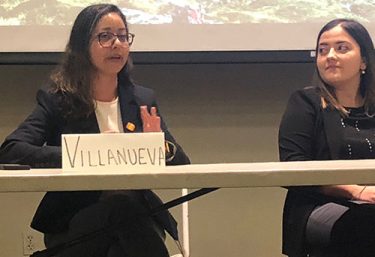
By Mike Kilen
GCU News Bureau
Casey Arellano remembered a time when she arrived in court and someone asked her if she was the interpreter.
It's in those moments that she thinks back to law school.
When she arrived at The George Washington University Law School as a public-school student with a scholarship, she found herself mixed in with boarding-school kids – Harvard graduates whose parents had two homes.
“As a Latina from Arizona, I spent the first two years of law school with impostor syndrome,” Arellano told Grand Canyon University students who attended Los Abogados Hispanic Bar Association’s panel discussion, “Unique Challenges and Opportunities for Hispanic Practitioners of Law," on Tuesday night.
“I felt like I didn’t belong. Even though I was there, maybe they made some decisions based on diversity goals. It took a really long time to accept that I deserved a seat at that table. But sometimes that feeling of impostor syndrome as a Latina translated to my career. Did I deserve to be here?”
Those challenges, said the attorney with the American Civil Liberties Union of Arizona, don’t change when you become a lawyer.
“People will make assumptions where you should practice, or maybe you got a position because of where you are from, how you look or how you speak.”
But the panel members, brought together by the GCU Pre-Law Society and the Latino Student Union, told students who are hoping for a future in law that you shouldn’t give up. You should adjust.
Arturo Gonzalez of the Chapa Law Group said that as the son of parents who weren’t educated past sixth grade, he had never been on a golf course, a key place to network. For his first golf outing, he had to borrow some clubs from a friend.
He learned that the outing really wasn’t about golf – it was about having fun, making connections and raising money for a charity.
“We learn as we go,” he said.
Kevin Walling, Chair of Justice Studies, Government and History in the College of Humanities and Social Sciences at GCU, said it was important to show that people of all backgrounds should consider law school or legal careers.
"We need diversity of all kinds in our law schools and the field of law because our nation is so diverse. Our diversity and understanding of others is not a weakness but a strength,” he said. “GCU is enriched and strengthened by that same diversity, and so are communities served by our diverse graduates in professional fields like law."

The panel included those who work on the business side of law, such as Cindy Villanueva of Lewis Roca Rothgerber Christie LLP, and others working as prosecutors with victims of crime, such as Crystal Morales of the Maricopa County Attorney’s Office.
Like many Latinas, Villanueva said she first got interested in immigration law and took many classes in that specialty. But there are many options beyond that for Latinas, and she shifted her focus.
“Yes, you can learn on the job,” she said.
The panel gave a different perspective to students who aren’t of Latino heritage, as well.
“It’s a really good opportunity to show people the different backgrounds of people in law school, the future of law in this country, as well as the roles they play,” said Dylan Mahoney, president of the GCU Pre-Law Society.
The panel gave advice on what to expect in law school, no matter your background. You will be thrown into grading on a curve with people who are the top students at prestigious schools, while balancing internships and clinics.
“It can be intense. I always say law school is like they rounded up all the Type A people in high school and they put them in a room, like ‘Hunger Games’ style, to see if you succeed,” Arellano said. “So those competing interests, coupled with the pressure, is really tough. You are used to succeeding, but for the first time, you might fail.”
But there is a place to come for help, especially for Latino students who are in the minority of those entering law school and legal professions.
Los Abogados’ local chapters love to hear from students, panel members said. The organization also launched a program to help pay for law school entrance exams.
Yessica Monge, a GCU senior who is studying pre-law with designs on getting into law school, said the panel showed her what to expect.
“It made me aware there is going to be some difference in diversity when I go to law school. I’ve felt so welcome at GCU, but now I will see it coming,” she said. “And now I know there is someone I can rely on, to have that support. I will definitely reach out to Los Abogados after I graduate.”
Grand Canyon University senior writer Mike Kilen can be reached at [email protected] or at 602-639-6764.



































































